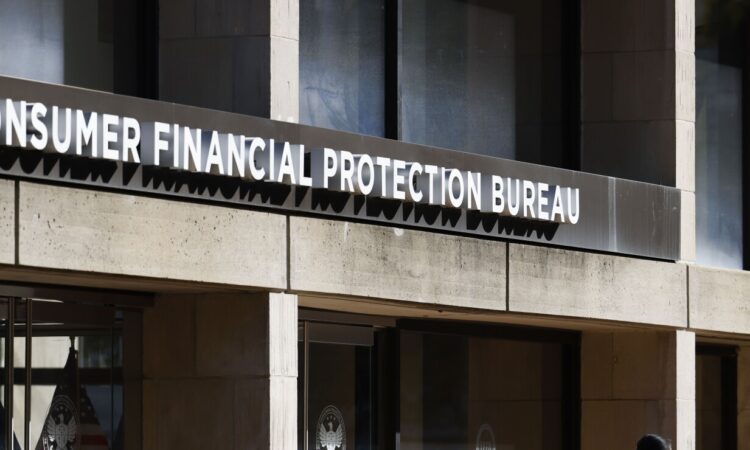
The US Chamber of Commerce and banking trade groups sued to block a Consumer Financial Protection Bureau rule capping credit card late fees at $8.
Banks and Republican lawmakers immediately decried the CFPB’s final rule upon its March 5 release, with the Chamber vowing to bring a legal challenge “imminently.”
The lawsuit, filed Thursday in the US District Court for the Northern District of Texas, alleges the CFPB exceeded its authority and used faulty economic analysis in developing the late-fee cap.
The American Bankers Association, the Consumer Bankers Association, and three Texas industry groups signed on to the Chamber lawsuit. The CFPB’s cap threatens to eat into fee profits at
The complaint alleges the CFPB rushed to finalize a rule to match a promise President Joe Biden made in last year’s State of the Union address to cut credit card late fees by 75%. To do that, the CFPB cut procedural corners, used bad economic analysis, and otherwise violated the Administrative Procedure Act, the complaint said.
“This rule is about politics not policy, and we look forward to the court’s review,” American Bankers Association President and CEO Rob Nichols said in a statement.
The CFPB plans to defend the rule, which the agency says will rein in banks’ “excessive charges.”
“The final rule closes a longstanding loophole abused by credit card giants to turn late fees into a major revenue stream, charging consumers more than five times the companies’ associated costs,” a CFPB spokesman said Thursday.
At the very least, the district court is likely to delay the late-fee rule, which currently is slated to take effect 60 days after its publication in the Federal Register. An industry victory could eliminate the regulation entirely and deal a blow to Biden, who has made combating so-called junk fees a centerpiece of his re-election campaign.
Late-Fee Cap
The CFPB’s final rule is set to slash credit card late fees from their current levels. Banks currently can charge up to $30 for a first missed payment and up to $41 for any missed payment in the subsequent six months while still qualifying for a safe harbor under a Federal Reserve regulation, the CFPB said in a March 5 news release. The average late fee actually charged by major card issuers increased to $32 in 2022, up from $23 at the end of 2010, the agency said.
The rule applies to credit card issuers with 1 million open accounts or more.
Along with the $8 cap, the CFPB is eliminating automatic fee hikes based on inflation, and will instead require card issuers to get the agency’s approval to raise their late fees above $8. The CFPB says the new fee cap represents the actual amount it costs banks to collect late payments and will prevent banks from generating profits off of struggling consumers.
The CFPB and the Biden administration say 45 million American consumers would save an average of $220 per year with the rule in place.
On the other side, banks could see their late-fee income slashed by more than $10 billion, the federal consumer watchdog estimated.
Federal judges in Texas and Kentucky last year put holds on a separate CFPB rule requiring small business lenders to collect demographic data on their borrowers. Those cases are on pause while the US Supreme Court weighs a constitutional challenge to the CFPB’s funding. The Supreme Court is expected to rule on the CFPB’s funding structure by the end of June.
Paul Hastings LLP is representing the Chamber and banking trade groups.
The case is Chamber of Commerce of the United States v. CFPB, N.D. Tex., No. 4:24-cv-00213, Complaint 3/7/24.





